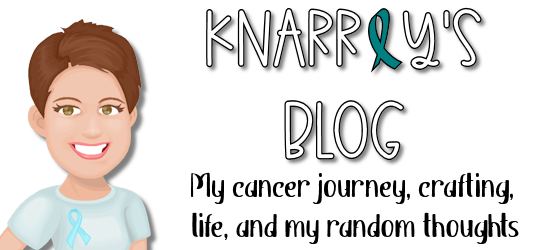Ovarian Cancer is one of the scarier cancers only because of the lack of symptoms, or symptoms that are easily explained by other illnesses or conditions. I want to make this blog not just about telling my story, but also about making people aware of this silent cancer. If I can help even one person get diagnosed early, then this page is doing its part.
Basic Ovarian Cancer Info
 Ovarian Cancer is cancer originating in the ovaries. It can be epithelial (on the surface of the ovary) or can be a germ cell tumor arising from the egg cells or supporting cells.
Ovarian Cancer is cancer originating in the ovaries. It can be epithelial (on the surface of the ovary) or can be a germ cell tumor arising from the egg cells or supporting cells.
Awareness ribbon color: teal
Awareness month: September
Did you know? When you are going for your yearly OB/GYN visit and getting a pap smear, they are only testing for cervical cancer? Ovarian cancer is not found on a pap smear.
Signs and Symptoms
Because most women don’t get symptoms at all, or get symptoms easily explained by something else, most cases of ovarian cancer are not diagnosed until a later stage. When symptoms arise, however, they can include:
- Bloating
- Abdominal or pelvic pain
- Difficulty eating
- Urinary symptoms
- Back pain
- Constipation
- Fatigue
- Abnormal vaginal bleeding
- Involuntary weight loss
- Build-up of fluid in abdominal cavity
- Mass found on testing
Because most of these are non-specific, what it boils down to is knowing your body! Anything that is abnormal, you should be calling your doctor to schedule a check-up. Don’t be afraid to call your OB/GYN before your yearly check-up. Ovarian cancer tends to move quickly, and you cannot wait. It’s much better to go to a visit and they find nothing, than to not go and have cancer progress.
Causes and Risk Factors
Most of the time, there really is no cause found for ovarian cancer cases. But there are some risk factors:
- Never having given birth (having a baby seems to have a protective factor)
- Use of fertility medication
- Infertility in general
- Endometriosis
- Using post-menopausal estrogen replacement therapy
- Genetics – having a first-line relative with breast or ovarian cancer increases your risk
- Genetics – having the BRCA1 or BRCA2 genes (causing a 60-85% chance of getting breast cancer and a 15-40% chance of getting ovarian cancer)
- Certain populations such as Ashkenazi Jewish women have a higher risk
- Having had breast cancer yourself
- A family history of uterine cancer or colon cancer may indicate Hereditary Nonpolyposis Colorectal Cancer or Lynch Syndrome; this puts you at higher risk for ovarian cancer
- Obscure link: drinking a lot of milk puts you at a higher risk (Swedish study)
On the other hand, there are some protective factors, as well, that seem to lower your risk:
- As mentioned, haven given birth. Also, having a first pregnancy at a young age tends to have a protective factor, and having your last pregnancy at an older age.
- Use of low dose hormonal contraception (use for 10 years lowers your risk by 60%!)
- Having a tubal ligation or hysterectomy
- Breastfeeding
- Removal of ovaries and fallopian tubes
- Obscure link: women in sunnier countries have lower risk…vitamin D link?
Diagnosis
So, if you think something is wrong and go to see your OB/GYN, they will do different kinds of tests. This starts with a pelvic exam. If the doctor has a reason to suspect ovarian cancer, they might do a blood test called CA-125 (a cancer marker test.) The CA-125 is not a reliable test, however, and is not a good indicator in all cases. (My cancer never showed on this test.) Your doctor might also prescribe a transvaginal ultrasound, a CT scan, or an MRI. Ultimately, though, the only sure fire way to know is through surgery and biopsy.
Statistics
- New cases in US yearly: about 21,000
- Deaths in US yearly: about 13,000
- Average age at diagnosis: 63
- 5 year survival rate by stage:
- 1A: 94%; 1B: 91%; 1C: 80%
- 2A: 76%; 2B: 67%; 2C: 57%
- 3A: 45%; 3B: 39%; 3C: 35%
- 4: 18%
(Information on this page was gathered from a wide variety of online sources)

Pingback: The Dangers of Heredity: The BRCA1 and BRCA2 Genes | Knarrly's Blog
Pingback: Cancer Awareness: September | Knarrly's Blog